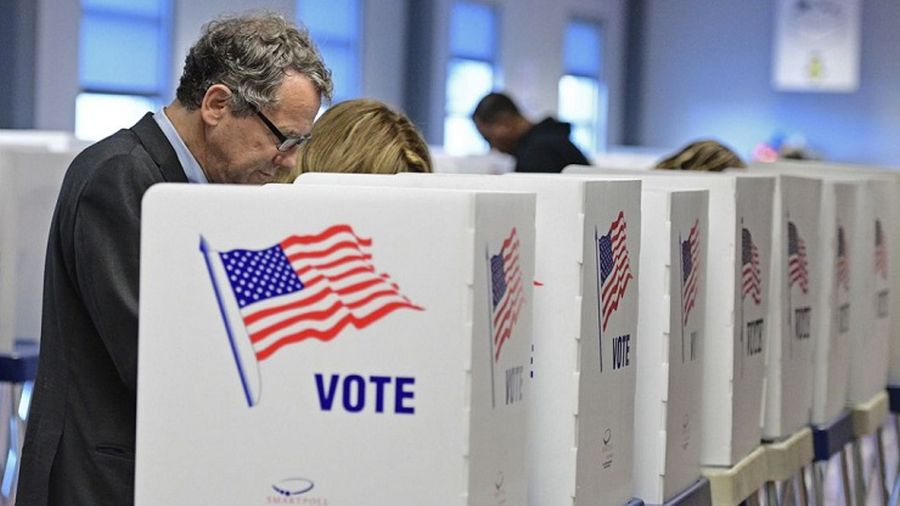US Midterms and What They REALLY Mean for the Rest of US–Everyone Else
US midterm elections don’t usually have much relevance outside the country. A change of President can have a profound effect on the world around, but the composition of Congress is much more of an internal matter, until recently.
Americans are very proud of their democratic system, which can be regarded as the world’s first liberal state – ironically, given that “liberal” is now a term of abuse in the US. The separation of powers means that the President can veto bills from Congress, and Congress can also override that veto, so neither can dominate the other, and both find it very difficult to dominate the people.
Nor does it matter much whether the President is from the party which has a majority in Congress, despite all the bellyaching about this at election time. If they are different, each can thwart the legislative agenda of the other, and a compromise has to be brokered. If they are the same, each wants the other to push through their agenda because of it, so intraparty disputes and fear of losing that majority make more compromises inevitable.
The eternal need for compromise is one of the reasons the military-industrial complex is actually able to run the United States, as it doesn’t have to stand for election or be held accountable in any real sense. Congresspersons do not have term limits but Presidents do, so by the time they have made the friends they need they are gone. But the real rulers are still there, often locking the executive and legislature into commitments they do not want, or know anything about before taking office, leaving them only small areas of policy and time in which to make their mark.
But it is always the President and “those who stand behind him” who sets the tone of policy and legislation. Whatever the sympathies of your Congressional representatives, you get a better deal if you like what the president likes. So Congressional elections are a commentary on the President more than anything else, and particularly midterms, where voters can say what they think without being held accountable for any changes that may bring.
The Same But Different
The US midterms generally follow the pattern of other mature democracies. The party of the President expects to lose ground because it is being judged on reality rather than promises, as was the case in the House of Representatives. If that party also controls Congress, it can expect a further pasting if it seen to be responsible for the realities the voters don’t like rather than the ones they do.
However, that was not the case this year, as Senators hold office for longer, six years, and the Senate remains in the hands of the Democrats, by a paper thin majority, with the potential tie-breaking vote of VP Kamala Harris. This is why Democrats still effectively hold on the majority due to the tie-breaking vote of Vice President Kamala Harris. Also, two independent Senators are not of party, but 50 Republicans, 48 Democrats, and 2 Independents will side “caucus with the Democrats”.
The big switch didn’t happen this time though. With Biden presiding over the worst economy since the one which sunk Jimmy Carter, and having achieved little of what his supporters want in a Congress controlled, just about, by his party, many predicted a “red wave” which would sweep a Republican majority into the legislature. Biden would then have been even more of a lame duck president, would be persuaded not to try and run again and the Democrats would have to select someone more easily branded as a dangerous loony who wanted to eat the babies of Middle America.
Instead the Democrats have held their ground remarkably well. They did not lose their majority in the House but were able to narrowly retain the Senate. Americans may not be happy with Sleepy Joe, but the Republicans don’t enthuse them either – and particularly the Trump faction election deniers, who in most cases did significantly worse than the so-called tolerators-collaborators in the rest of the party.
Election Deniers Lost Key Races for Federal and State Offices in the 2022 Midterm Elections. Does this matter to the rest of the world? It does, because the reason for this is not the desire to keep everyone in check which prevented the predicted “blue wave” in 2020, when the electors wanted Trump out, but not what the Democrats stood for in its place.
This unexpected result was caused by the fact that the new conditions of the world we live in are beginning to bite. It is not about policies but about fatigue with the old and same rhetoric. It is now clear that Americans are more fed up than anything. This mind-set will set a tone which will affect the behaviour of the US in the international arena just as the idealism and youth of the Kennedys once did.
Sleepwalking To The Top
Relatively Joe Biden is actually very bright and active for a man who turned 80 on November 20th. But there are endless jokes about him being slow and senile because his style is so ordinary in comparison to other Presidents of living memory.
It is highly-likely that neither Biden himself, his party or his supporters could have imagined that he would walk into being as emblematic of his age as Reagan was of his. He didn’t do it deliberately, but has found himself riding one of those recurring waves of history because has ended up the most fitted person to do so, in spite of all his shortcomings.
When King George I succeeded to the throne of Great Britain in 1714, a few months after becoming heir presumptive of England on the dubious grounds that he was Queen Anne’s closest living Protestant relative, he was the Elector of Hanover and spoke no English. The political circumstances of having a specifically Protestant monarch imposed by England led to rebellions, and various intrigues within parliament, and George’s lack of interest in public affairs was the main driver for the development of parliamentary and cabinet government, and creating accepted boundaries for a constitutional monarchy.
Few actually wanted George himself, even if they wanted a Protestant succession when religious conflict was the equivalent of the Cold War. Fewer still liked him, or approved of his mistresses or the fact he never did learn enough English to talk to anyone important. In fact he refused to speak to them in French either, though he was reasonably fluent in it and most important English people could speak it well.
But eventually George gained public acceptance because the alternative was conflict. He was a blank slate when one was needed, his office the old certainty everyone could live with, even when not embracing him. No one had to like him, but as long as they got up in the morning they could accept the system he happened to be king of.
This is what generally happens after wars, revolutions and pandemics. People just get tired, and want whatever means they don’t have to think any more. The Taliban’s initial takeover of Afghanistan didn’t occur because they were radical Islamists but because they came along when everyone was tired of fighting and of being told what to fight over. The violence and lunacy didn’t matter. Nor does it even now to many Afghans now; they tired of the enforced modernisation of US-backed governments who were seen as more radical than the Taliban itself.
Sleepy Joe represents the world after the [perceived] radicalism of Trump and the personality cults of those who went before him. However radical are some of his supporters, real or perceived, they are part of a more familiar US tradition than the divisive short term populists Trump exploited in all his many cons.
US voters have the temper of a different time, when we are all sick of hearing about this crisis and this or that solution. Just give us what we know and leave us alone, so we can afford to drive to work and not have to borrow money to live. Such a shift in attitude will have a more fundamental consequence for US foreign policy, and the realities in the many US “partner” states, than any of the active policy initiatives of previous presidents, or the agendas of the military-industrial complex behind them.
Just Smile and Agree
When George Bush Senior was nominated by the Republicans to succeed Ronald Reagan he promised in his first speech a “kinder, gentler nation”. He ended up only lasting one term because that promise meant a retreat from substance.
But for a while the mantra caught on – the largely unknown Bill Clinton won the Democratic nomination for the election in which he ousted Bush because Bush was long considered unbeatable, and the better known Democrats wanted to wait until they had a chance of winning. The Reagan era wasn’t quite enough to move on from, but after pandemic and war and crisis it does now appear the time for this has come.
A kinder, gentler US in the international sphere will be one which selects episodes from its past which puts the US in a better light. There will not be a conscious return to any particular point in diplomatic history, but assumption rather than rhetoric will be the default US position in its global stance.
We are much less likely to see the US identifying different enemies and waging war on them now US voters are sick of arguments. Such posturing, and the actions seen on the nightly news bulletins, used to win votes but aren’t delivering them anymore—and having this the opposite effect and people are starting to change channels or simply not watch.
Instead the US will influence by sitting there. Instead of telling people they want democracy, human rights, neoliberal economics and rule of law, and therefore have to accept whatever the US inflicts upon them under those guises, the US will have to start assuming that people like and want these things and the US supports these natural and superior assumptions, even if it does little in practice to bring these things about.
The US has always known there is a huge difference between what it claims its values are and what actually goes on under its tutelage in its military and political partner states. However in the past 40 years or more the presentation of that has changed—and this is what is most likely to reverse itself now.
Since the end of the post-World War Two consensus the US view has been that whatever the US wants is better than anything else, and these discrepancies are therefore secondary. Now we will be going back to the previous presentation, in which every country is presumed to want what the US thinks it is, and whatever they have now is not ideal, but the best which can exist under the circumstances.
The US will still not be trying to develop an independent civil society, and will still make it easier for friends rather than enemies to win elections and make any effective decisions. But it will now once again get away with saying that these defects are steps towards a more American future selected by the people, rather than one imposed because the US interest is the only one with any moral legitimacy.
Like children in a school playground, US representatives in other countries will play with anyone without first asking who they are and what they intend to do to you, because they know that at the end of the day they all want the same things. Doing the opposite takes too much effort, makes too much noise, and implies an on-going ideologically-driven engagement which has no meaning when American voters, and ultimately their representatives, are more worried about food and gas prices than the politics of the places their food and gas come from.
Not Before Time But Not After It
The post-radical US will not be an unalloyed benefit by any means. Certain things will continue as before, just that it needs to be packaged differently to strike a balance between domestic and global audiences.
We still won’t know where much of the aid and “democracy development” really goes. It will be siphoned off as usual into projects designed to shore up designated friends for the sake of doing it, regardless of their relationship with what the support was ostensibly designed for.
But it is now less likely that these funds will be used to undermine anyone, or to fund terrorism, regime change or large scale drug smuggling. It is more probable that the US will want to be seen doing things the populations of host countries regard as positive, because that is the position expected of a respected donor.
The US will still pursue its values so far and no further. Democracy will only be promoted until it brings results the US doesn’t want, at which point it will be described as corrupted by foreign infiltration and suppressed. Rule of law won’t prosecute US corruption; human rights won’t apply to minorities who are not the flavour of the month. But all this will be much lower key, even if more under the counter, when Americans want more knitting patterns and less General Patton.
Nor will any of this make Americans fonder of their politicians. Even if they become as civil as members of the British House of Lords, they still won’t generally be trusted. But that was always a US default, and a divided Congress will bring will only comfort US voters more, by confirming their prejudices against those strange hot-air filled creatures who preach to them at every election cycle.
But there is an unmistakeable change of tone from loud to subterranean. If this can be spoken with the certainty of maturity rather than the anguish of lost youth, the US might finally become a member of the family of nations, not a tyrant bullying orphans it created itself.







